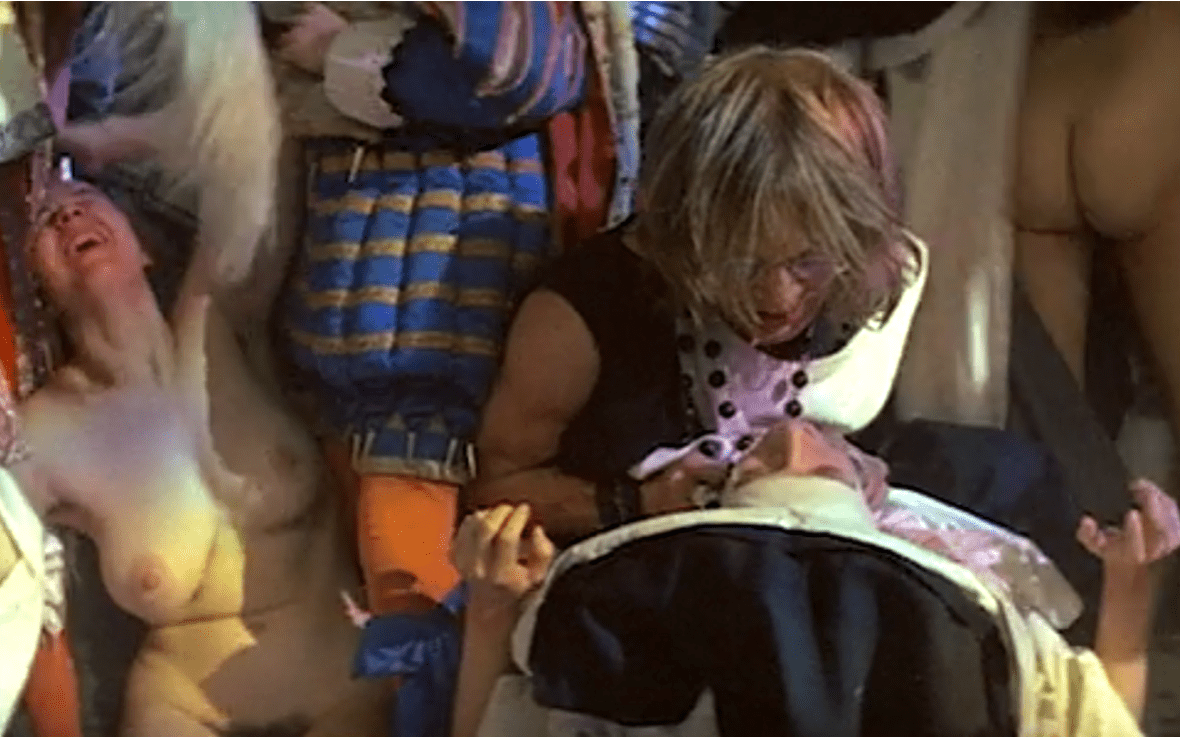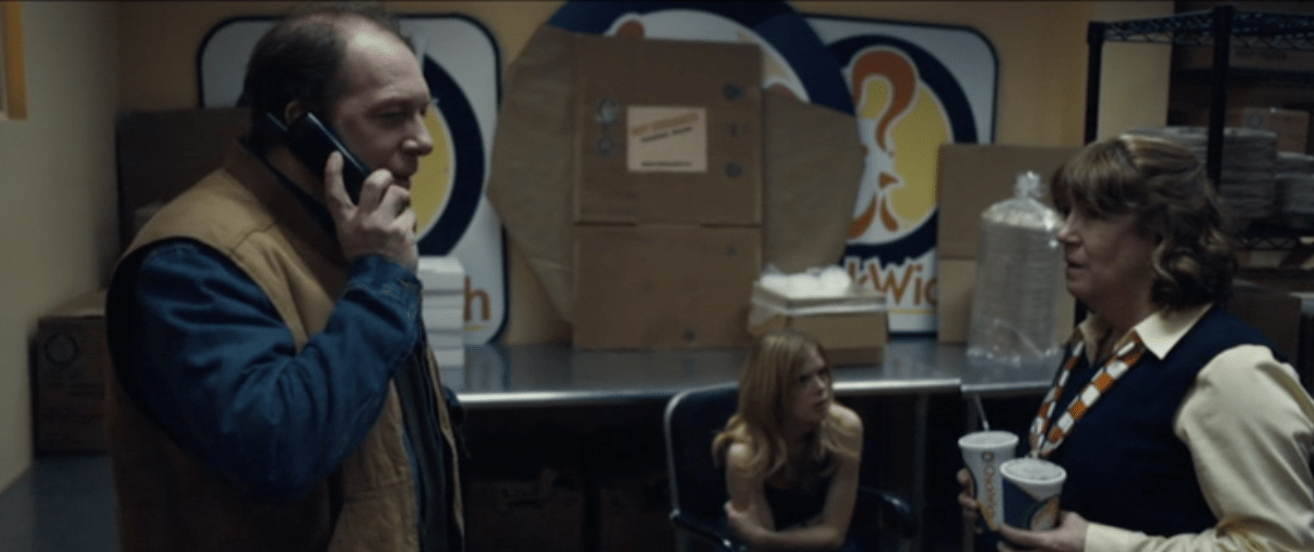
Much of what makes a Todd Solondz movie compelling is its ability to strike a razor-thin balance between sincerity and satire, between tragedy and absurdity. His films are like horrible car wrecks that cause more horrible car wrecks and become horrible, twisted, mountains of burning cars. Two cars crashing is terrible, three or four is worse but at some point, if it keeps piling up, it becomes ridiculous which opens the door to humor. A dissociative, unstable, nervous sort of humor but humor none the less. In an interview, Solondz once said “Comedy and pathos are inextricably intertwined.”

Life During War Time (2009) is Solondz’s sequel to his 1998 film Happiness. As a film Happiness will knock you on your ass. There isn’t any other movie quite like it. The scene where a 9-year-old boy confronts his father about his father being a pedophile has to be one of the most uncomfortable, painful, and somehow kind of humorous scenes in film history. The poor son wants to know if his father, who has molested two of the son’s friends, wants to also molest him. When the son asks if his father wants to “fuck” him, it’s unclear whether the son is frightened of his father or jealous that his friends received special attention. The whole thing makes you want to crawl under a rock.
Life During Wartime uses different actors to play the characters that were created for Happiness. This affords Solondz a strange sort of leeway in reinterpreting the nature of each character. There is no effort made to make them look the same. One character goes from being white to being African American, but even so, there is also a sense that all the characters are older now and have changed. As the title implies the whole world has changed. The 9/11 terrorist attacks have resulted in America waging a war, but this new war is nothing like the two world wars or Vietnam. Those wars loomed large in the nation’s collective consciousness. They effected America’s everyday life. The new wars in Afghanistan and Iraq were more remote, less palpable. As I write this essay we are still fighting this same war after 19 years, but there are very few domestic signs of it.

Solondz uses the war as a collective source of ambient anxiety. It is buried deep under the surface but it still generates dis-ease. When Solondz allows it to erupt to the surface it seems abrupt and irrelevant as if it has burst forth at the wrong time. Helen, a narcissist so delusional as to rival that president whose name shall remain unspoken, is in the middle of a self-centered rant and ends her monologue with “We are a nation at war you know!” It comes out of nowhere, and there is simply no way that such an egotistical individual could possibly care about a distant war that has no immediate effect on her life. None the less it is evoked and hangs in the air like an unforeseen interruption.
Solondz requires skillful and nuanced performances from his actors. In Happiness, he had Philip Seymour Hoffman, Dylan Baker, Lara Flynn Boyle, Jon Lovitz, and Ben Gazzara. In Life During War Time, he had Allison Jenney, Ally Sheedy, Michael Williams, Paul Reubens, Charlotte Rampling, and Ciaran Hinds.

They are all required to walk a line between sincere vulnerability and overwrought parody. Assisting them are a myriad of carefully considered details from costume, to makeup, to lighting, and especially location. Solondz world is an ugly place where characters often seem alienated and uncomfortable. They inhabit carefully designed spaces created for capitalism and the easy consumption of the suburbs.

Much of the film takes place in restaurants where the characters have to make an effort to keep their composure. The audience expects complete access to the characters but their lives are kept guarded by their circumstances. They are interrupted by waitresses, and at home, they are forced to put on a brave face for their children, or they try to present amiable and calm facades for each other.
In films like Happiness, Life During Wartime, Welcome to the Dollhouse (1995), and Wiener-Dog (2016), Solondz uses children as catalysts for chaotic, ill-timed revelations. Children either complicate things by thoroughly misunderstanding adult issues, or they cut right through the delicate adult nuance and bluntly hit the nail on the head causing everyone to cringe. If anyone is a stand-in for Solondz it is most likely his child characters. They see and hear more than they should and we worry for their sanity. As an audience member, you share the discomfort of seeing and hearing things that are best left private. You wince and cringe through the whole hour and 38 minutes.
After a grave discussion with his mother little Timmy walks away believing that if a man touches him in any way the man is a pedophile. This of course ends up making a terrible mess. Partly it is due to the mother’s inability to be clear, but it is also due to her inability to speak soberly about pedophilia having once been married to a pedophile. She is so traumatized by her past experience she is unable to think or speak clearly on the subject and so confuses her son. One car wreck leads to another.
In an interview about working on Life During Wartime Ally Sheedy who plays the nasty narcissist, said of Solondz, “He has huge sympathy for these characters. He really has compassion for them and I think kinda loves them, so he will not tolerate… any kind of commentary on the character at all, and if he felt like any of that was happening he would stop it… ‘Don’t comment on her, you just have to be her.’ It’s almost like he wouldn’t let you mistreat this person.”

Solondz’s relationship to the characters and the story is earnest. Their expressions are not a joke, but they are often funny. They are funny in a defensive and hopeless way, like an abuse victim laughing at something darkly humorous about their situation. It’s almost as if they temporarily see their situation from another perspective, or discover a painful irony. We don’t always laugh because something is funny.
Part of understanding Solondz’s dark or sometimes strange humor comes from Solondz’s Jewish heritage. He uses Judaism as a theme that runs through the movie like an anxious touchstone. The title of the film itself could be seen as a reference to the Jewish experience. World War 2 never ended for many Jews. There is a saying that every Jewish family has a packed suitcase in the closet.
One of the characters is about to be bar-mitzvahed. He often refers to the fact that he is now a man, which only highlights the fact that at 13 years old he obviously isn’t. He is ill-equipped to handle the adult situations all around him. His mother is rediscovering her Jewish identity and is dating a Jewish man. She revels in the man’s “Jewishness” as if it is erotic. He is very far from attractive but she is carried away by some suburban fantasy of normality. As she floats in this reverie she ends up revealing too much about her sexual attraction for him as her son stands innocently in the kitchen looking on like a puppy tilting its head side to side trying to understand.
Judaism has long been associated with a morbid and humorous acceptance of fate. There is a sense that suffering is inevitable, more than inevitable, it’s right around the corner. Optimism is not the Jewish way. There is a saying in Yiddish “kein ayin hara” often followed by “pu pu pu.” The pu pu pu is said in substitution of spitting three times. It translates to “no evil eye.” Kein ayin hara is invoked any time a person says anything positive. There is a fear that if you compliment someone, or celebrate good fortune you invite catastrophe, a bit like hubris. This phrase is never said in the film but the anxiety of a world that can turn against you is palpable.
As a stand-alone film, Life During War Time might not be as strong as Happiness but together they create an interesting diptych. Life During Wartime considers the larger national context in a way that Happiness does not. In addition, the use of different actors in the second film to play the characters in the first film creates a strange resonance.
Solondz has marked out a miserable and comic bit of territory where he meticulously constructs portraits of the inhabitants. He considers every inch of them from what they wear to the music that they listen to. If Sheedy is right he may be the only one who is comfortable in this place but he keeps sending out invitations for us to come and join him.

If you enjoyed this article click here for more
www.filmofileshideout.com/archives/alan-arkins-little-murders



